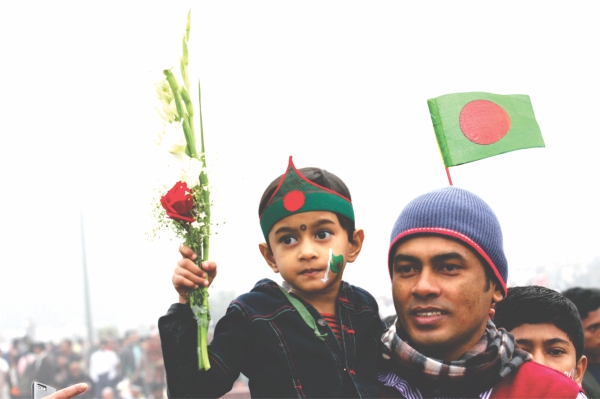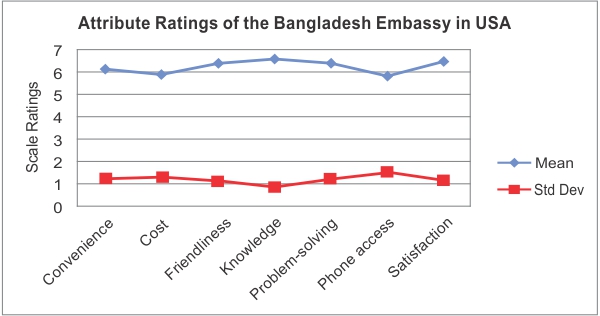
Inside
Original Forum |
| Photo Feature -- Lives in Ruins |
Missed Euphoria |
| The Story of December 1971 -- Syed Badrul Ahsan |
| Surrender at Ramna Racecourse -- Break of a new dawn after endless nightmares -- Ziauddin Choudhury |
| Seeking Refuge -- Tawheed Rahim |
Bangladesh's Quest for Freedom and Economic Equality --- Syeed Ahamed and Rezwana Abed |
Photo Feature |
Bangladesh media: Caught in censorship's crossfire? -- Hana Shams Ahmed |
Weak Father, Strong Mother and (In)visible Nation: Genre and narrative in Bangladesh popular cinema -- Zakir Hossain Raju |
| Bowling Chinamans with Shehan Karunatilaka -- Quazi Zulquarnain Islam |
| Bolstering Country Image through Consular Services: Perspectives from the Bangladesh Embassy in Washington, DC -- Syed S. Andaleeb and M. Humayun Kabir |
| Endnote -- Kajalie Shehreen Islam |
Bolstering Country Image through
Consular Services: Perspectives from the
Bangladesh Embassy in Washington, DC
SYED S. ANDALEEB and M. HUMAYUN KABIR discuss the importance of our missions abroad in portraying a positive image of Bangladesh.
Managing a country's image is vital in today's globalising world. A vast and growing literature suggests that images associated with a country can be important for gaining global political status and legitimacy. Concomitantly, it facilitates acceptance of products and services from that country, thus boosting exports, vitalising tourism, health and related services, while attracting investments. Malaysia and India (among others) have recently launched the "Malaysia, Truly Asia" or "Incredible India" campaigns to refurbish their images and woo both visitors and investors, while gaining political mileage and influence. The Chinese, too, are on a new mission to reinvent and rebrand themselves as innovators instead of being perceived as backyard factories. In this panorama of changing images, Bangladesh cannot sit by and let others define its image.
 Palash Khan
Palash Khan
In fact, Bangladesh has many positive attributes and achievements to be proud of that project a stellar image. Fighting oppression, it has gained liberation and independent nationhood. It has begun a nascent democratic journey. It has gained international recognition and credibility through its two famous poverty warriors: M. Yunus and F.H. Abed. The garments industry has blazed its way to the top ranks, establishing global acceptance of the country's RMG products. Ship-building and pharmaceutical industries have begun making critical inroads as well. And the country's peace-keepers have performed laudably in overseas assignments. Yet, because of several debilitating factors, especially in politics and governance, that work their way into corrupt practices, Bangladesh's remarkable achievements have been overshadowed.
How can Bangladesh address this conundrum? How can the "seventh" largest nation based on population size establish a more positive and productive ethos? How can the nation reposition itself as a modern progressive nation?
Desired images of a nation are not built overnight; they evolve from a multiplicity of factors that interact and produce a net image effect. Such factors include political stability, governance, enduring institutions and a decent economy and infrastructure. It also requires an industrious people, disciplined and imbued with high moral values, well-educated and a pleasant and friendly attitude.
An important determinant of a nation's image is its representatives abroad. In this context, the nation's embassies have an important role to play. Interfacing with various constituencies, they can enhance or diminish a nation's image in how they present themselves, in their quality of communications, the issues they choose to engage with, and the general sense of confidence they exude.
It is vitally important, therefore, that a nation sends its best and brightest abroad to represent the country, not what political expediency or other considerations may dictate. After all, diplomatic practices have seen significant changes in a world undergoing transformation and requiring a different set of skills and understanding of our diplomats. While some of the traditional functions of diplomacy are still relevant and useful, new contents and contours have redefined the diplomatic landscape; indeed they have enriched and challenged the practice of diplomacy in many ways. Consequently, diplomacy has practically moved away from its former bureaucratic interactions to multilayered engagement with multiple actors at all levels of human interactions: individual, bilateral, regional and global. This has necessitated forging better coordination between the Ministry of Foreign Affairs and the diplomatic missions abroad in articulating and communicating national messages in a more creative way, delivering services in a more business like manner, and engaging with multiple stakeholders, including the ever growing expatriate and Diaspora community. In the process, consular services have emerged as an extremely useful front-line activity to connect with clients and as a vehicle to promote national image abroad and advance national interests in the larger context.
Keeping this objective in mind, the Embassy of Bangladesh in Washington, DC undertook a number of initiatives to improve the quality of consular services in 2007. Continuous performance evaluation was built into the system to gauge the effectiveness of such engagement with support from a ranked university in the United States. Incidentally, this was the first such effort ever undertaken by a diplomatic outpost of Bangladesh.
This article presents how Bangladesh's consular services are perceived in the United States. It focuses on a number of key factors representing the services of the consular section. While the findings are not necessarily conclusive, they lay the foundations for understanding how to evaluate consular services in general and suggest how similar studies could be conducted to develop a common yard stick for Bangladesh embassies operating in other countries.
Findings
Respondents rated their 'contact experience' (through visitations, phone calls, etc.) with the consular services of the embassy on a five-point scale -- poor to excellent. Of the 102 respondents 43 were foreigners; 62.8% of them gave an excellent rating (score of 5), while 23% gave it a very good rating (score of 4). The overall average rating on this item was 4.37, while the standard deviation, s, was 1.02. This reflects favourably on the particular embassy.
On service delivery, 65.5% of the respondents indicated that the required service was delivered within three days. Only two persons received their service in 14 days, one in 21 days, and one in 45 days. Occasionally such delays are caused by the service recipients themselves because of the mistakes they make on their application. The overall average score on this item was 4.21 days.
Interestingly, 48% of the respondents felt the services of the embassy were "far better" than their experiences with the embassies of other countries; 31% felt it was "better." In other words, 79% of the respondents indicated a positive impression of the Bangladesh embassy's service orientation relative to other embassies. The average score on this item was 4.33 on a 5-point scale (s=.83).
Next it was found that 38% of the respondents felt their experiences at the Bangladesh embassy were "far better" than their past visits to the same embassy while 34.7% felt it was "better." The average score on this item was 4.24 (s=.79) on a five-point scale.
Respondents also rated a variety of other factors shown in the chart. On convenience of hours, the average was 6.14 (s=1.27) on a 7-point scale. The frequency distribution indicated that more than half (54.7%) of the respondents strongly agreed (with a rating of 7) that the hours were convenient; another 24.2% fairly agreed (with a rating of 6).
Ratings on how reasonable was the cost of service were also sought. On the 7-point scale, the average was 5.92 (s = 1.33). The frequency distribution indicated that 44.3% strongly agreed that the costs were reasonable; another 26.8% fairly agreed.

Regarding the friendliness of the staff, the average score was 6.40 (s=1.19) -- a high rating. The frequency distribution indicated that 71% strongly agreed that the staff was friendly; another 14% fairly agreed.
On the knowledgeability of the staff, the average score was 6.57 (s=.90). The frequency distribution indicated that 72.2% strongly agreed that the staff was knowledgeable; another 20.6% fairly agreed.
Regarding whether the staff helped solve their problem, the average was 6.40 (s=1.25). The frequency distribution indicated that 71.6% strongly agreed that the staff helped solve their problems; another 14.7% fairly agreed.
On user-friendliness of the forms to be filled out, the average was 6.46 (s=1.09). The frequency distribution indicated that 68.5% strongly agreed that the forms were user-friendly; another 21.3% fairly agreed.
Convenience of telephone services at the embassy was rated an average of 5.83 (s=1.56). The frequency distribution indicated that 45.2% strongly agreed that the telephone services were convenient; another 27.4% fairly agreed.
Finally, people's ratings on their overall satisfaction with the embassy's services was rated an average of 6.47 (s=1.18). The frequency distribution indicated that more 75% strongly agreed that they were pleased with the services of the embassy; another 10.9% fairly agreed.
Conclusions
Embassies, as frontline representatives, generally project a country's image to other nations through their activities. This pilot study indicated that the Bangladesh Embassy in the United States has done a commendable job of keeping the consular service seekers satisfied. All of the ratings were highly positive on service performance, suggesting that the Embassy has been able to project a good image that can ultimately reflect on the image of the country. Tracking visitor-driven service standards are important in assessing the nation's image and reinforcing the nation-brand. The mean scores should be noted with satisfaction. In particular we note that there has been no strong negatives associated with consular services in the selected embassy.
These evaluations could be used as a benchmark against which future assessments could be made to track the perceived quality of services of the Bangladesh Embassy in Washington, DC. In fact, the same measures could also be used to assess how the other embassies and Consulates General /Consulates are performing. If doing so becomes cumbersome or costly, selected "key" embassies could be brought under the purview of the metrics that this study has identified.
The findings could also be useful for training the diplomats from Bangladesh so that they understand the value of the key attributes that can help project the nation's image. It is also important that these personnel are the best trained, the best motivated, and the most willing to serve on behalf of the nation. This also means that significant effort must be devoted to hiring the right personnel, developing them, providing them with needed support, compensating them, and devising ways of retaining and rewarding the best among them.
Suggestive in this exploratory study is the need to make Bangladeshi diplomats proficient in interactive skills. It is also important to empower them, promote teamwork, develop internal processes with supporting technology, and treat them as "internal" assets to be valued for the job they perform. Embassy staff satisfaction is also vital to nation-branding and demands attention if they are to perform at a high level of proficiency.
It may be desirable to establish a visitor satisfaction index (VSI) to periodically compare the quality of services of different embassies. Such an index could help the administration take effective measures when the services at specific embassies begin to falter on the service metrics.
The proposed metrics, when monitored effectively, can lead to sound practices of sensing and serving those who seek to build a relationship with Bangladesh. In so doing, the Ministry of Foreign Affairs can be a frontline establishment helping build the image of Bangladesh to greater heights. Once a positive ethos begins to take root, the social capital that accumulates can generate many positive externalities for the nation with enormous benefits.
Dr. Syed Saad Andaleeb is Distinguished Professor of Marketing at Pennsylvania State University, USA and Editor, Journal of Bangladesh Studies.
M. Humayun Kabir is a former career diplomat from Bangladesh who served as Ambassador to the United States of America and Nepal and as High Commissioner to Australia. Currently he is Vice President, Bangladesh Enterprise Institute (BEI), Dhaka.